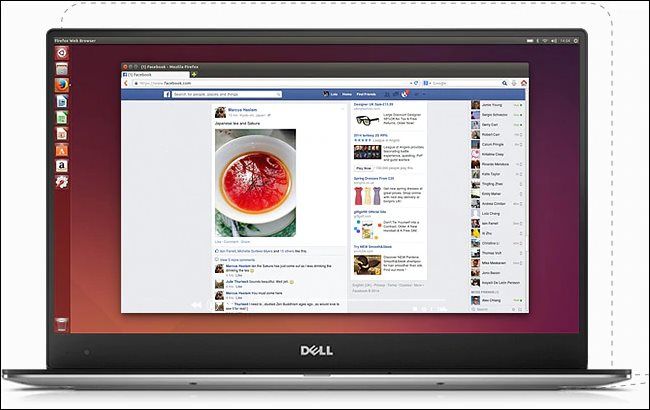Quick Links
The fabled "Year of the Linux Desktop" has never materialized, and it likely never will. Does that mean Linux on a desktop PC is irrelevant? Not at all! Desktop Linux is still awesome.
The Year of the Linux Desktop?
Dirk Hohndel, who was then the chief Linux and open-source technologist at Intel, predicted that in 1999, Linux would penetrate the PC desktop market and displace Windows. He's credited with coining the phrase "the year of the Linux desktop."
Two decades later, we're still waiting. Every year or so, an industry pundit will stick their neck out and declare that year the year of the Linux desktop. It's just not happening. About two percent of desktop PCs and laptops use Linux, and there were over 2 billion in use in 2015. That's about 4 million computers running Linux. The figure would be higher now, of course---possibly about 4.5 million, which is, roughly, the population of Kuwait.
Yet, Linux runs the world: over 70 percent of websites run on it, and over 92 percent of the servers running on Amazon's EC2 platform use Linux. All 500 of the fastest supercomputers in the world run Linux. There's even a Linux or FreeBSD-derived kernel in your smartphone, whether it runs iOS or Android, and there are over 2.5 billion Android smartphones.
Any smart gadgets in your home almost certainly run embedded Linux and network switches, routers, and wireless access points.
Apart from the desktop PC, Linux dominates---but does that even matter?
Why Only 2 Percent?
I frequently speak at events, and, afterward, I get to talk to a lot of people about technology. I'm no longer surprised that most people haven't even heard of Linux, nor do they know or care what an operating system is. I've met Mac owners who thought their computer was running Windows "the Apple way," and Chromebook owners who thought they were using Android. Of course, both Android and Chrome OS are built atop a Linux kernel, anyway.
It seems the majority of people---even those at a tech talk---don't give a moment's thought to what is inside their computer. They want sleek hardware, fast performance, and long battery life. Above all, they want to be able to run either the same software as their friends or what they use at work.
They either buy a computer or laptop and get Windows by default, or they buy a Mac. People tell me they bought a Mac because they were told it was "simpler to use," or because they like their iPhone, so they got an Apple computer. People buy computers like they buy microwaves. They don't care what makes them go, they just want to reheat food.
Of course, there are others who are more familiar with technology. They can make informed decisions about the equipment they buy or self-assemble, but they're in the minority. People who use Linux desktops are in this category, but we're the minority of the minority.
When I speak to people who understand a bit more about operating systems, the reasons they give for not running Linux are variations on a set of the following themes:
- Gaming: Gaming on Linux has improved in leaps and bounds over recent years, but there's still more choice in the Windows world. The perception that it's easier to run top-end, optimized gaming hardware on Windows also persists.
- Linux won't run a certain software: Whether it's Photoshop, AutoCAD, or Microsoft Office, this is a deal-breaker for many people. They're not interested in alternatives or running things under Wine.
- Fear of the command line: They don't want to have to learn something new.
- They don't want to be different: They want to use the same things their friends and family use.
- They don't have an opinion on personal freedoms: Such as free software and open source.
- They don't want to tinker: They just want to get on with their work.
Is Hardware the Answer?
Dell and HP have offered hardware options pre-installed with Linux since 2007 and 2004, respectively. System76 has been providing designed-for-Linux, high-end laptops and computers since 2005. There's a new wave of computer hardware shipping with Linux as the operating system, like the range of powerful machines from Tuxedo and the budget-friendly line from Pine64.
But who's buying these devices? Are they winning new converts or selling to the established Linux base? It's difficult to imagine anything other than the latter for the domestic crowd, although businesses and other organizations might also invest in them.
The city of Munich famously switched from Windows to Linux in 2004 and, equally famously, swapped back 10 years later. They're now in the process of reverting to Linux.
Barcelona's transition from Windows to Linux is currently underway. They're replacing all desktop applications with open-source alternatives. They'll swap over to Linux when the only proprietary software in use is the operating system. The idea is the staff will already be familiar with the applications, so the hop to Linux won't be much of a culture shock.
Using Linux at work might change what people feel comfortable running when they get home, but that can go in one of two ways, of course.
Then, There's China
In China, we might soon see a large spike in the number of people using Linux desktops as a result of the U.S. trade embargo with Huawei. Beijing has ordered every one of its government and public institutions to replace all computer equipment and software sourced from outside China, including Windows.
They've also created their own Deepin-based Linux distribution to help them achieve this, called the Unity Operating System (UOS).
Who's Using Linux?
There are people who still use Linux among all of the following:
- Longtime devotees and hobbyists.
- People who used a *NIX at college or professionally.
- Those with hardware that's too old or underpowered to drive Windows 10.
- Councils, administrations, businesses, and charities.
- Computer science majors.
- People interested in open-source software, free software, and privacy.
- The curious.
- People who came to Linux for any reason and found themselves at home.
- Developers---lots of developers.
If the world runs on Linux, the world needs Linux developers. The wealth of development tools that are freely available on Linux is astounding. Whether for application, web, cross-platform, or embedded development, professional-quality toolchains are at your fingertips. So much so, that developers were leaving the Windows platform for the superior Linux development experience.
The Windows Subsystem for Linux (WSL) was Microsoft's way of luring them back. The latest version, WSL2, includes a genuine Linux kernel, providing a close to naked Linux experience for the developer.
As Ray Davies of The Kinks sings, "It's a mixed up, muddled up, shook up world." Linux is inside Windows 10, and Microsoft has released applications for Linux. That's a sentence I never thought I'd type.
You can install Microsoft's Visual Studio Code integrated development environment on Linux and freely use it for private and commercial projects. You can also use a Microsoft Teams native Linux client to collaborate with your colleagues while you're coding.
These applications are not open source, so they're free (as in beer, not as in speech). Still, someone at Microsoft is sitting up and taking notice. If the world runs on Linux, the world needs Linux developers, and Microsoft wants them to be developing cross-platform on Windows.
2 Percent of Desktops: Does It Matter?
Linux didn't take over the desktop world, but does that really matter? After all, it's universal. It already practically runs the Internet and the Internet of Things. It's in space, nuclear submarines, and self-driving cars. It's an amazing operating system with an amazing story.
And a small number of us even use it on our desktop PCs.


